Is the cafe dream still worth chasing? Maybe not, say past owners – but many still find it hard to let go
Cafes have become symbols of passion, community, and cultural capital. But the reality of burnout is much less rosy, said owners both past and present.
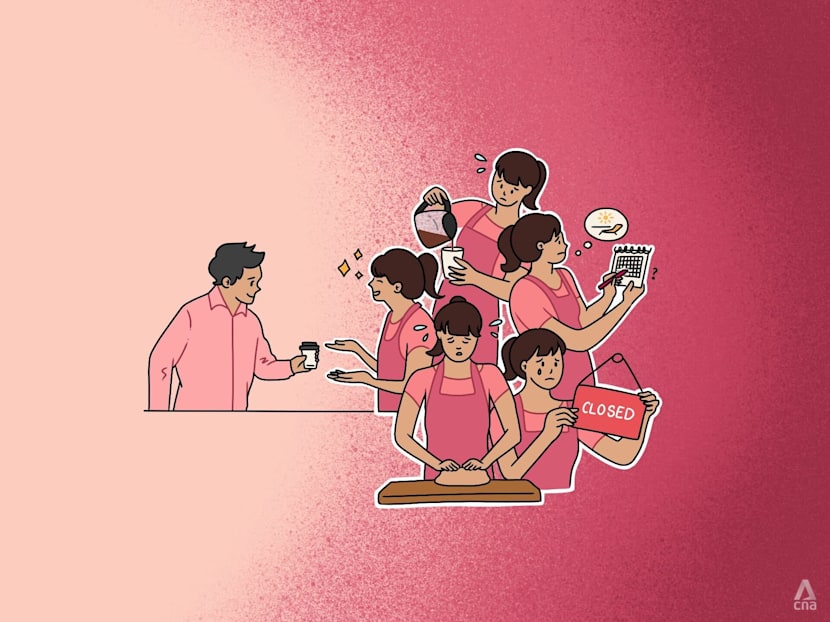
For many young adults, opening a cafe has become a popular aspiration but many have gone on to learn that passion alone isn't enough to keep the doors open. (Illustration: CNA/Nurjannah Suhaimi)

This audio is generated by an AI tool.
Ms Chanel Li was eight years old when she got her first oven.
Her passion for baking only grew stronger with parent-child classes her mother took her to. She later became a flight attendant in adulthood, but while stowing packets of Irvins salted egg fish skin into overhead galley compartments, she dreamt about a day when other cabin crewmembers might do the same with her tarts.
Her dream became a reality in 2022 with the opening of her cafe – a dream that's now set to end in a matter of months, as the 27-year-old prepares to close Cafe Lilac by Whisking Bakes in May 2026.
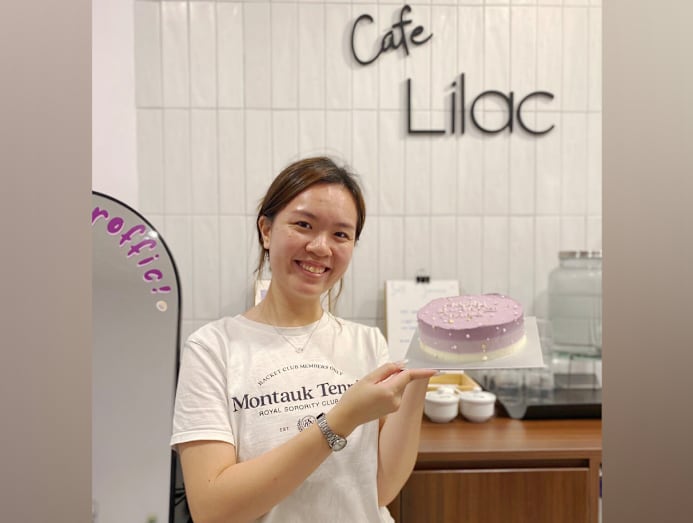
Culinary school graduate Shawn Koh, 37, in 2024 made the difficult decision to wind down the business he had spent a decade pouring his heart and soul into.
Flavour Flings had earned itself a loyal clientele over the 10 years it was in business, but even that support wasn't enough for him to keep his dream going.
Across Singapore, stories like theirs have become increasingly common. For many young adults, opening a cafe has become a popular aspiration – a way to chase dreams of independence, creativity and community.
However, many have gone on to learn that passion alone isn't enough to keep the doors open.
Singapore's food-and-beverage (F&B) sector continues to face mounting pressures, with more than 3,000 businesses ceasing operations last year – averaging about 250 closures each month. It was the highest level of turnover in nearly two decades, and has sparked intense debate among business owners and consumers alike on the increasing fragility of brick-and-mortar ventures.
In spite of these risks, the romantic notion of cafe ownership continues to captivate Singaporeans.
WHAT'S SO DREAMY ABOUT CAFES?
Dr Lau Kong Cheen, head of the marketing programme at the School of Business in Singapore University of Social Sciences (SUSS), said the appeal of owning a cafe is much stronger among millennials and Gen Zers compared to other generations.
Compared to Gen Xers and baby boomers who largely drank coffee at home or from casual roadside or kopitiam stalls, millennials and Gen Zers grew up during the "second wave of coffee" and are more accustomed to large mass-market chains such as Starbucks.
These bright and clean modern establishments became social hubs for connection and self-expression, added Dr Lau, invoking a stronger sense of emotional connection.
Popular media has also reinforced widespread perceptions of cafes as places where one can seamlessly combine work and leisure, said Dr Jinna Tay, a senior lecturer at the department of communications and new media in National University of Singapore (NUS).
"Cafes are where people like to hang out and build community – as we often see in film and television," she said.
"In that sense, (younger) generations are drawn to the idea and possibility of this freedom."
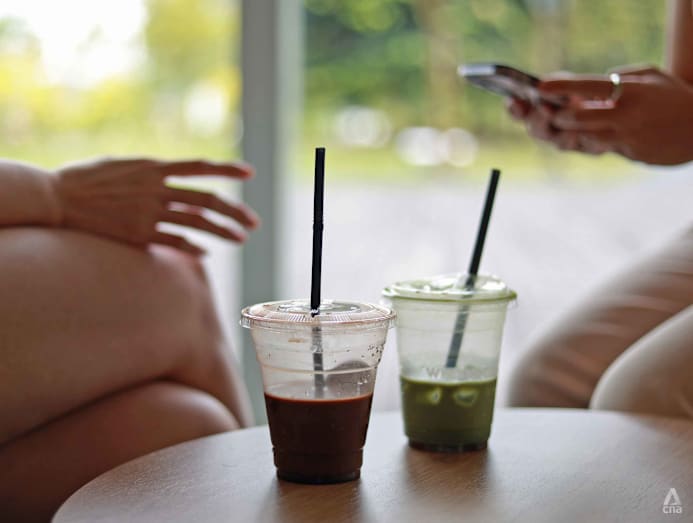
Increased international travel, said SUSS' Dr Lau, has also exposed young Singaporeans to established cafe cultures abroad, inspiring many to recreate similar experiences at home.
"It is not just about owning a F&B establishment. It is owning a piece of cultural capital," he said.
Yet, cafe owners past and present told CNA that this romanticised ideal often clashes with the realities of running the business.
In pursuit of her cafe dream, Ms Li encountered many hurdles even before opening the doors to Cafe Lilac.
"From the small things like setting up a smooth counter workflow, to handling customer issues and creating standard operating procedures, there were many challenges I hadn't anticipated," she said.
MORE THAN JUST COFFEE
In theory, a good location and a tasty menu should be enough to sustain any F&B business, or even turn it into a success.
In reality, cafe owners have found it to be a relentless balancing act of operational strategy, staffing and constant problem-solving.
Even under the best-case circumstances, long hours, hands-on management and constant attention to upholding product and service standards leave little room for any rest.
"I had a good landlord, staff, money and a good customer base," said Mr Koh. "The reason I closed (Flavour Flings) is because I was tired."
Aside from solid fundamentals, success in today's cafe landscape also hinges on marketing and even online virality. Fleeting bursts of sudden, widespread attention are capable of making or breaking a business.
At Flavour Flings, Mr Koh's salted egg yolk croissant marked the cafe's first viral moment in 2016, drawing long queues and widespread media attention.
The cafe went on to survive the disruptions of the COVID-19 pandemic by generating new viral moments, including halal raclette cheese, a Yakult cake and even Milo popcorn chicken.
But behind every new product was a complex web of operations, from sourcing ingredients and coordinating with suppliers to perfecting plating and managing staff.
For every hit, there was a dud that failed to take off with customers, despite equally concerted efforts from Mr Koh and his team.
"If marketing isn't there, creation is useless," he said.
The more "hype" items Flavour Flings managed to come up with, the more Mr Koh found himself not wanting to disappoint their growing customer base. He insisted on keeping these items on the permanent menu, even when it became too taxing to keep serving them.
The result was burnout – a sobering reminder that in the F&B business, success can be as demanding as it is rewarding.
After a decade tethered to his cafe, Mr Koh decided it was time to see what else was out there for him.
"Money can always be earned, but mental health matters," he said.

Even for veterans, the day-to-day reality of running a cafe can be overwhelming.
Mr Alwin Lau, 33, has two cafes under his belt, including Bloom Coffee which closed its doors in end-2023 and now continues as an online store selling coffee beans.
He was also part of the founding team behind Anteroom Coffee Brewers, which opened its doors in 2018.
But even with the benefit of experience, cafe ownership remained "a constant juggling act", he said.
"You have to pivot constantly just to make things work. There's always something that needs troubleshooting."
The harsh demands of working long hours and taking responsibility for nearly every aspect of the business grow even harsher for owners of smaller cafes who have to manage everything themselves.
"We're not big enough to hire finance or customer service staff," said Ms Li of Cafe Lilac.
For her, once operations had stabilised around two years after opening, the novelty of running the cafe started wearing off and boredom began setting in.
"It became routine and mundane," she said. "I didn't know how to find my spark again."
BURNOUT BEHIND THE BREW
Almost all the former cafe owners CNA TODAY spoke to cited steep rental increases and manpower challenges as the most difficult parts of sustaining their business.
For cafe owners, beyond the constraint of Singaporeans shunning F&B jobs and Government quotas on foreign hires, lies a more personal challenge: finding staff who share their commitment to upholding the same standards.
When Ms Krystal Nguyen, 35, founded Kinky Keto in 2022, her biggest struggle was in trying to find suitable staff.
Over time, she gradually built her team with part-timers, with one full-timer eventually coming aboard. But even with staff to share the burden, she was at the cafe in Biopolis nearly every day. After three years of this, she found herself drained, with little time for herself or her family.
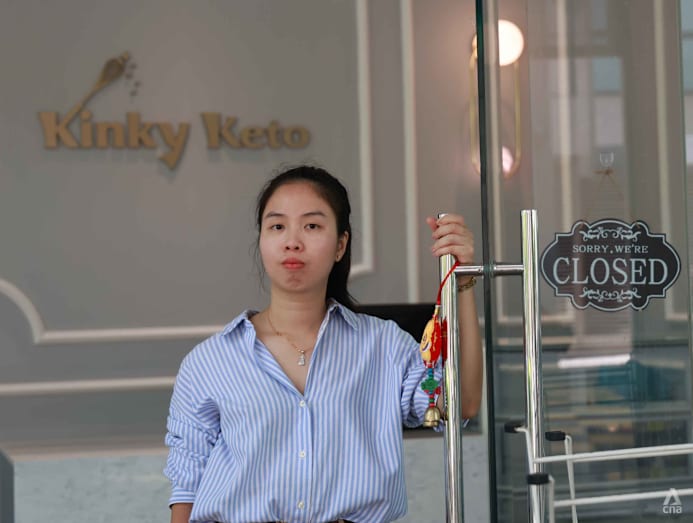
During this time, she also saw neighbouring cafe units changing hands quickly, with many closing after only a few months and some remaining vacant since the start of the year.
Seeing little point in struggling endlessly to keep Kinky Keto afloat, Ms Nguyen decided not to renew her lease after it ended in September 2025.
The struggle to find reliable staff is all too familiar to Ms Li who had to rely primarily on part-time hires – typically students who only stayed a few months each time.
"I can't expect them to give their all. After all, it's just a part-time job while they're studying," she said.
That is why to this day, she feels the need to be present constantly to keep her cafe running smoothly. "Even when you find someone (suitable and available), they might not be consistent – and when service standards drop, customers notice," she said.
FROM LABOUR OF LOVE TO EMOTIONAL DRAIN
On top of logistical concerns, the emotional toll of cafe ownership can be significant.
Mr Lau of Bloom Coffee said that instead of worrying about his own income or next pay cheque, he spent most of his time and energy making sure staff and suppliers were paid first. His attempts to step back, too, were often thwarted by manpower shortages.
Stretched thin by the constant slew of cafe concerns requiring his attention, he began questioning if the lifestyle was sustainable for him, especially as he wanted to settle down and care for his elderly parents.
For Ms Li, personal reflections and emotional triggers – including the death of her childhood dog last year – were equally important in her decision to step away.
"I felt a lot of guilt, not having been there for her a lot towards the end," she said.
"It made me rethink whether this is the life I want forever."
Despite facing burnout and the erosion of personal passion and drive for her cafe dream, closing Cafe Lilac proved to be a highly emotional choice for her.
With the business doing reasonably well and the strong bonds she had forged with regular customers, she felt she didn't have the "right" to give up. After all, unlike many others in the industry, she wasn't seeing losses each month.
It's a unique dilemma to deal with, one complicated by the intertwining of personal ambition, emotional sentimentality and business sensibility – all intensified by virtue of being in the position of ownership.
"There's no one to talk to," said Mr Khoo Keat Hwee, the former owner of Coffee & Chirashi.
"You can't tell your family because you're afraid they'll worry. You can't tell your friends because you're afraid they'll judge. You can't tell your employees because they'll feel unease or worry that the business is going to close."
Besides Coffee & Chirashi, the 38-year-old also previously owned hawker chain Mentai-Ya. Both businesses have shuttered after sustaining six-figure losses.
"It felt like watching a ship slowly take in water month after month, trying to patch every leak," he said.
"A lot of people romanticise owning a cafe. (They think of) nice coffee, good vibes, chill music. But honestly? It’s one of the toughest businesses to survive in."
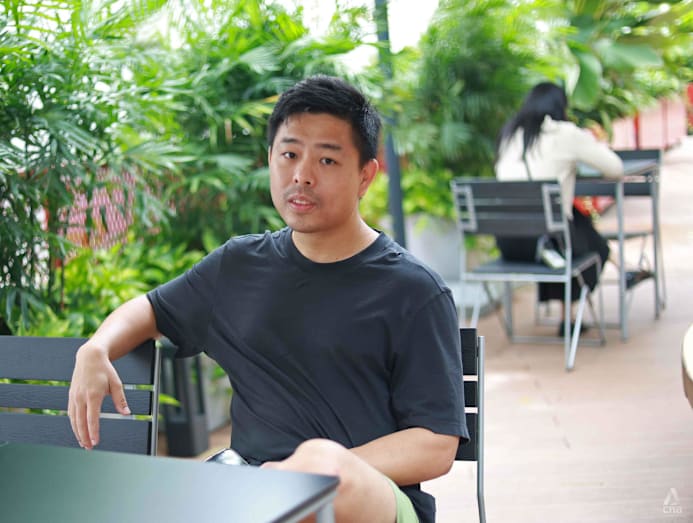
THE PRICE OF STAYING ON – OR STARTING UP
Even as some choose to let go of their cafe dreams, others are holding on despite the toll of it all.
For those still in the game, it remains a daily test of stamina and sheer determination.
Since opening The Better Half at the Everton Park cafe cluster in 2019, Ms Neo Hwee Ying, 30, and Mr Jonathan Ng, 32, have shouldered the full weight of running a small cafe – a weight that only seems to be growing heavier as time passes.
"Everything has increased – ingredients, utilities, packaging, and cost of living," said Ms Neo.
"But we're really lucky to have a kind and supportive landlord keeping the rate low for us," she added. "If the rental were to go up ... we wouldn't be able to continue."
The couple expressed understanding for why other cafe owners choose to cut their losses, given the industry's extremely demanding nature. They, too, find themselves constantly bogged down by the same problems, including long hours and slim profit margins.
On top of that, longer-term factors weigh on their minds: their ageing bodies, a shared desire to purchase a house together, and their parents' retirement, among others.
Despite an uncertain future in F&B, they are determined to keep operating for as long as they can.

Even as established cafes grapple with staying afloat, new entrants are still stepping into the scene.
Eager to pursue their dream despite the increasingly bleak outlook, the duo behind 9Brew, Mr Austin Lee and Ms Chloe Lim, both 32, officially jumped into the cafe game this year.
Before opening the doors of their commercial storefront in Paya Lebar Square a month earlier, the married couple was running operations from their home, a low-cost testing ground for them to practise their brewing skills and savvy, refine operations and learn to manage inventory.
After leaving his corporate job as a project coordinator in 2023, Mr Lee spent a year honing his skills – learning speciality coffee at a renowned cafe on weekdays while running his home cafe on weekends.
In end-2024, a burgeoning spotlight on home-based cafes convinced Mr Lee that the next step was a retail space.
"We calculated costs – beans, overheads, everything – to see if we could cover them and take things one step at a time," said Mr Lee.
Even with all the careful planning, they found themselves quickly overloaded with details and the investments required.
"Once you go through the process, you understand why some in the F&B industry are critical of home-based setups," he added.
Moving to a commercial outlet however opened up new opportunities.
With certifications like the Singapore Food Agency (SFA) licence, better advertising potential and fewer concerns about invading neighbours' privacy, the shift has enabled them to start planning for larger-scale events and collaborations.
For now, they still see coffee as their passion even if "putting food on the table" also weighs on their minds.
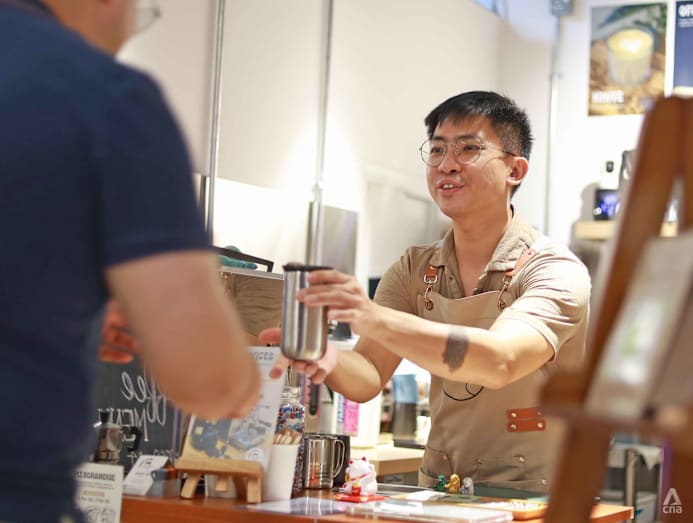
FOR CAFE OWNERS WITHOUT A CAFE, WHAT'S NEXT?
While many have already called it quits on running their own bruising cafe race, the passion for coffee and food often never fully fades away.
Mr Koh, for instance, has kept his Flavour Flings brand alive online.
"(When we closed our physical store,) we made it clear it wasn't a full goodbye. I really just wanted to take a breather," he said.
While he's spent the past year in a new corporate job in the food safety industry, he said he misses cooking and plans to re-enter the F&B industry at some point.
Like Mr Koh, Mr Lau too has moved on from his cafe but not from F&B entirely. He continues to run Bloom Coffee as an online store, and also holds a day job as an account manager in a firm importing speciality green coffee.
Former owner of Kinky Keto Ms Nguyen is already on the hunt for a suitable location to reopen her cafe in her home city of Ho Chi Minh, Vietnam, where the cafe market is growing.
However, with family ties in Singapore and a love for the local food scene, she remains hopeful about a future where conditions for small F&B operators improve in the Republic.
"It's not a goodbye, just a farewell for now," she said.
Mr Khoo, too, has not lost his passion for the business of food. Even so, he admitted that his business model for Coffee & Chirashi was not sustainable given the clash between rising operational costs and customer expectations for affordable food.
He has since transitioned into F&B consulting, hoping to draw on his own painful lessons to help others overcome the challenges he once faced.
His advice for aspiring cafe owners: "Either raise proper funds or stay small and focused. Scaling without enough support is the fastest way to burn out."
For former cafe owners, part of what makes the loss of their establishments so heartfelt is the bonds formed with repeat customers.
Throughout the last week of Kinky Keto's operations, Ms Nguyen's regulars repeatedly dropped in to bid her farewell.
Mr Lau, too, highlighted the small, personal interactions at Bloom Coffee that made everything worthwhile.
He described receiving the news that a couple who frequented his cafe was expecting, and then later on seeing them walk in with their child in tow.
He also recalled how when he saw a "regular" walk in, he would already start preparing their coffee.
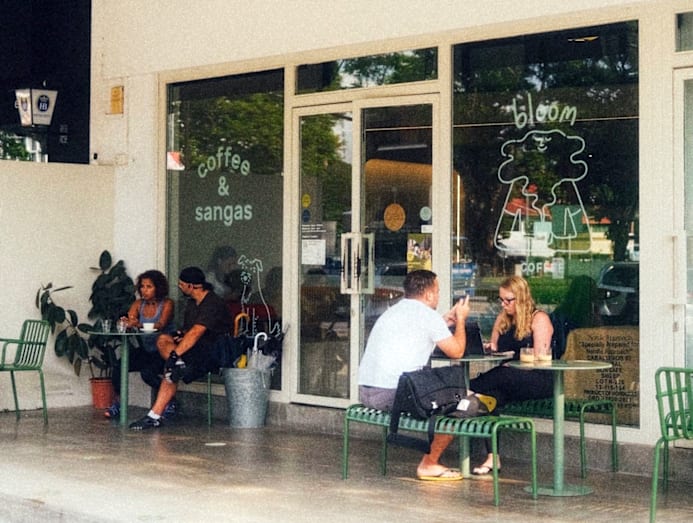
"That personal touch is what I valued most," he said.
Cafes like Cafe Lilac often also serve as a sanctuary for some customers, noted Ms Li.
"One customer mentioned how she spends the only time in the week she has for herself in our cafe after sending her daughter to music lessons upstairs," Ms Li recalled.
Moments like these were bright spots of affirmation for her that all the thought she had put into creating a welcoming cafe space had truly paid off, down to the smallest details like where to put electrical sockets.
Nevertheless, she's cognisant that closure is still "the right choice".
"It's quite scary to decide to move on without knowing what's next," she said. "But (I have to) – otherwise I might remain stuck for a long time."














